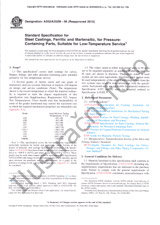Potřebujeme váš souhlas k využití jednotlivých dat, aby se vám mimo jiné mohly ukazovat informace týkající se vašich zájmů. Souhlas udělíte kliknutím na tlačítko „OK“.
ASTM F2721-09(2023)
Standard Guide for Preclinical in vivo Evaluation in Critical-Size Segmental Bone Defects
Přeložit název
NORMA vydána dne 1.3.2023
Informace o normě:
Označení normy: ASTM F2721-09(2023)
Datum vydání normy: 1.3.2023
Kód zboží: NS-1103736
Počet stran: 14
Přibližná hmotnost: 42 g (0.09 liber)
Země: Americká technická norma
Kategorie: Technické normy ASTM
Kategorie - podobné normy:
Anotace textu normy ASTM F2721-09(2023) :
Keywords:
animal models, biomaterials, bone, bone regeneration, bone repair, defect generation, devices, implants, in vivo, mechanical testing, synthetic biomaterials, TEMPs (tissue-engineered medical products),, ICS Number Code 11.100.10 (In vitro diagnostic test systems)
Doplňující informace
| Significance and Use | ||||||||||||
|
4.1?This guide is aimed at providing a range of in vivo models to aid in preclinical research and development of tissue-engineered medical products (TEMPs) intended for the clinical repair or regeneration of bone. 4.2?This guide includes a description of the animal models, surgical considerations, and tissue processing as well as the qualitative and quantitative analysis of tissue specimens. 4.3?The user is encouraged to use appropriate ASTM and other guidelines to conduct cytotoxicity and biocompatibility tests on materials, TEMPs, or both, prior to assessment of the in vivo models described herein. 4.4?It is recommended that safety testing be in accordance with the provisions of the FDA Good Laboratory Practices Regulations 21 CFR 58. 4.5?Safety and effectiveness studies to support regulatory submissions (for example, Investigational Device Exemption (IDE), Premarket Approval (PMA), 510K, Investigational New Drug (IND), or Biologics License Application (BLA) submissions in the U.S.) should conform to appropriate guidelines of the regulatory bodies for development of medical devices, biologics, or drugs, respectively. 4.6?Animal model outcomes are not necessarily predictive of human results and should, therefore, be interpreted cautiously with respect to potential applicability to human conditions. |
||||||||||||
| 1. Scope | ||||||||||||
|
1.1?This guide covers general guidelines for the in vivo assessment of tissue-engineered medical products (TEMPs) intended to repair or regenerate bone. TEMPs included in this guide may be composed of natural or synthetic biomaterials (biocompatible and biodegradable) or composites thereof, and may contain cells or biologically active agents such as growth factors, synthetic peptides, plasmids, or cDNA. The models described in this guide are segmental critical size defects which, by definition, will not fill with viable tissue without treatment. Thus, these models represent a stringent test of a materials ability to induce or augment bone growth. 1.2?Guidelines include a description and rationale of various animal models including rat (murine), rabbit (leporine), dog (canine), goat (caprine), and sheep (ovine). Outcome measures based on radiographic, histologic, and mechanical analyses are described briefly and referenced. The user should refer to specific test methods for additional detail. 1.3?This guide is not intended to include the testing of raw materials, preparation of biomaterials, sterilization, or packaging of the product. ASTM standards for these steps are available in the Referenced Documents (Section 2). 1.4?The use of any of the methods included in this guide may not produce a result that is consistent with clinical performance in one or more specific applications. 1.5?Other preclinical methods may also be appropriate and this guide is not meant to exclude such methods. The material must be suitable for its intended purpose. Additional biological testing in this regard would be required. 1.6?The values stated in SI units are to be regarded as standard. No other units of measurement are included in this standard. 1.7?This standard does not purport to address all of the safety concerns, if any, associated with its use. It is the responsibility of the user of this standard to establish appropriate safety, health, and environmental practices and determine the applicability of regulatory limitations prior to use. 1.8?This international standard was developed in accordance with internationally recognized principles on standardization established in the Decision on Principles for the Development of International Standards, Guides and Recommendations issued by the World Trade Organization Technical Barriers to Trade (TBT) Committee. |
||||||||||||
| 2. Referenced Documents | ||||||||||||
|




 Cookies
Cookies
